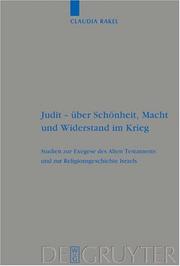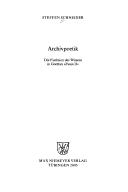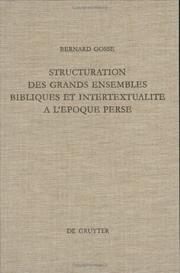| Listing 1 - 6 of 6 |
Sort by
|

ISBN: 3110179261 3110899981 9783110179262 Year: 2015 Volume: 334 Publisher: Berlin ; Boston : De Gruyter,
Abstract | Keywords | Export | Availability | Bookmark
 Loading...
Loading...Choose an application
- Reference Manager
- EndNote
- RefWorks (Direct export to RefWorks)
Das Buch Judit enthält eine Vielzahl intertextueller Bezüge. Vorbilder für die Juditfigur waren nicht nur Mose, David und Judas Makkabäus, sondern auch biblische Frauengestalten, die Gewalt erfahren oder selber ausüben, ebenso wie weibliche Personifikationen der Stadt Jerusalem. Im Zentrum der Studie steht das Lied in Jdt 16,1-17, das eine theologische Deutung der Ereignisse des Juditbuches liefert und die Aussage vertritt, dass Gott Kriege zerschlägt. Das Buch Judit wird im intertextuellen biblischen Dialog als ein Plädoyer für Widerstand gegen Gewaltregime gelesen, nicht mit den Mitteln des Krieges, sondern mit dem strategischen Einsatz weiblicher Schönheit. The Book of Judith contains a veritable wealth of intertextual references. Models for the figure of Judith were not just provided by Moses, David and Judas Maccabeus, but also by biblical female figures who were either the victims or themselves the perpetrators of violence. The study is centred on the song in Judith 16, 1-17, which provides a theological interpretation of the events in the Book of Judith and puts forward the statement that God crushes wars. In the intertextual biblical dialogue, the Book of Judith is read as a plea for resistance to a violent regime, not with warlike means but through the strategic deployment of female beauty.
Judith --- 222.8 --- Tobit. Judit. Ester. Esther --- Theses --- Bible. --- Criticism, interpretation, etc. --- Feminist criticism. --- Feministische Theologie. --- Intertextualität. --- Judith (Buch). --- Intertextualität --- Feministische Exegese --- RELIGION / Biblical Criticism & Interpretation / Old Testament. --- Feministische Theologie --- Exegese --- Textualität --- Transtextualität --- Intermedialität --- Interpikturalität --- Book of Judith --- Judith (Book of the Apocrypha)

ISSN: 04407164 ISBN: 3484151080 3110940981 Year: 2011 Volume: n.F., Bd. 108 Publisher: Tübingen : Max Niemeyer Verlag,
Abstract | Keywords | Export | Availability | Bookmark
 Loading...
Loading...Choose an application
- Reference Manager
- EndNote
- RefWorks (Direct export to RefWorks)
Zu den Eigentümlichkeiten des »Faust II« gehört es, dass Goethe darin eine Vielzahl von Wissenselementen eingearbeitet hat. Die Funktion dieser Anspielungsfülle wird mit dem Begriff der 'Archivpoetik' belegt. Damit werden drei Aspekte der Bezugnahme auf das Archiv der Epoche bezeichnet, deren Untersuchung sich diese Studie widmet. Erstens stellt sie Goethes gelehrtes Verfahren in einen Bezug zur Wissens- und Wissenschaftsgeschichte. Dies geschieht beispielhaft, indem sie die Bedeutung der Geologie, der wissenschaftlichen Mythosforschung, der Philologie und der Weltliteratur für das Drama herausstellt. Zweitens fragt sie nach den Verfahren, die dieses Wissen poetisieren: Durch Selektion und Rekombination erfährt das Archiv eine Dramatisierung, durch die es überschritten wird. Doch zugleich bleibt der dramatische Text auf die in ihm geborgenen Wissensinhalte transparent. So bildet das Archiv ein Reflexionsmedium, in dem sich die Dichtung in ihrem Verhältnis zum Wissen selbst thematisieren kann. Diese Reflexion betrifft insbesondere die Möglichkeit symbolischer Repräsentation in der Zeit einer radikalen Temporalisierung des Wissens, die im »Faust II« zur ästhetischen Utopie wird, während ihre Realisierung aber durch die moderne Wissenschaft in Frage gestellt ist. Die Modernität des »Faust II« muss daher weniger in seinen Gegenständen als vielmehr in dieser Form der Selbstreflexion der Poesie gesehen werden.
Goethe, Johann Wolfgang von --- Goethe, Johann Wolfgang von, --- Goethe, Johann Wolfgang von / Faust II. --- Intertextualität. --- Poetik. --- Wissen ‹Motiv›. --- Wissen. --- Wissen --- Intertextualität --- Poetik --- LITERARY CRITICISM / European / German. --- Ästhetik --- Dichtungstheorie --- Literarästhetik --- Literaturästhetik --- Dichtkunst --- Literaturtheorie --- Poetologie --- Kenntnis --- Kenntnisse --- Erkenntnis --- Wissensproduktion --- Textualität --- Transtextualität --- Intermedialität --- Interpikturalität --- Motiv --- Literatur --- Ästhetik --- Literarästhetik --- Literaturästhetik
Book
ISBN: 9783110307504 3110313200 9783110313208 3110307502 Year: 2013 Publisher: Berlin ; Boston : De Gruyter,
Abstract | Keywords | Export | Availability | Bookmark
 Loading...
Loading...Choose an application
- Reference Manager
- EndNote
- RefWorks (Direct export to RefWorks)
Intertextual borrowing and references to literary models characterize Arthur Schnitzler’s narrative works to a much greater degree than previously thought, as is clearly revealed in this study. The transformation of Schnitzler’s aesthetic orientation is reflected in his choice of pre-texts. While his early narratives make more extensive reference to French literature, the narrative works of his middle and late periods are notable for their individualized choice of pre-texts, which specifically attune their intertextual references to the particular post-text.
Schnitzler, Arthur, --- Critique et interprétation --- Criticism, Textual. --- Schnitzler, Arthur --- Critique et interprétation. --- Intertextualität. --- Narratologie. --- Schnitzler, Arthur. --- Vienna modernism. --- Wiener Moderne. --- intertextuality. --- narratology. --- Prosa --- Intertextualität --- LITERARY CRITICISM / European / German. --- Textualität --- Transtextualität --- Intermedialität --- Interpikturalität --- Erzählende Prosa --- Erzählprosa --- Fiktionale Prosa --- Kunstprosa --- Prosaepik --- Prose fiction --- Prosawerk --- Erzählwerk --- Prosatext --- Prosawerke --- Prosatexte --- Literatur --- Epik --- Shnitsler, Arṭur, --- Sznicler, A., --- שניצלער, ארטור --- שניצלער, ארטור, --- שניצלר, ארטור --- שניצלר, ארטור, --- שניצלר, ארתור --- Шніцлєр, Артур, --- Shnit︠s︡li︠e︡r, Artur, --- Textualität --- Transtextualität --- Intermedialität --- Interpikturalität
Book

ISBN: 1575066564 9781575066561 9781575062181 1575062186 Year: 2021 Publisher: University Park, PA
Abstract | Keywords | Export | Availability | Bookmark
 Loading...
Loading...Choose an application
- Reference Manager
- EndNote
- RefWorks (Direct export to RefWorks)
"The essays published here are revised versions of papers presented in 2008 and 2009 in the section devoted to Israel and the Production and Reception of Authoritative Books in the Persian and Hellenistic Period at the annual meeting of the European Association of Biblical Studies. The various contributors explore what was authoritative for Chronicles and what authoritative might have meant for the Chronicler from different perspectives. The volume includes chapters by Yairah Amit, Joseph Blenkinsopp, David J. Chalcraft, Philip R. Davies, David A. Glatt-Gilad, Louis Jonker, Mark Leuchter, Ingeborg Löwisch, Lynette Mitchell, Steven J. Schweitzer, Amber K. Warhurst, and the two editors, Diana V. Edelman, and Ehud Ben Zvi. This volume will be of particular interest to scholars and students of biblical literature and all who are interested in ancient Israelite historiography, in Chronicles, in the intellectual history of Israel in the Persian/early Hellenistic period, and in issues of biblical proto-canonicity, authority, and criticism."--Back cover.
Bible. --- Chronicles (Book of the Old Testament) --- Divre ha-yamim (Book of the Old Testament) --- Paralipomenon (Book of the Old Testament) --- Yŏktae kisŏ (Book of the Old Testament) --- Yŏktaegi (Book of the Old Testament) --- Chronikbuch (Book of the Old Testament) --- Evidences, authority, etc. --- Criticism, interpretation, etc. --- 222.7 --- Kronieken. Ezra. Nehemia --- Intertextualität. --- Exegese. --- Authority --- Authority (Religion) --- Religious aspects. --- Chronik --- Textualität --- Transtextualität --- Intermedialität --- Interpikturalität
Book
ISSN: 0777978X ISBN: 9789042930735 904293073X Year: 2014 Volume: 232 Publisher: Leuven ; Paris ; Walpole, Ma. : Uitgeverij Peeters,
Abstract | Keywords | Export | Availability | Bookmark
 Loading...
Loading...Choose an application
- Reference Manager
- EndNote
- RefWorks (Direct export to RefWorks)
This volume contains the papers of the second meeting of the international scholarly network "The Hermeneutic of Judaism, Christianity and Islam," held in Aix-en-Provence (September 25-27, 2008). Drawing on Gerard Genette's theory of the five different types of "transtextuality" (Palimpsestes, Paris 1982) - intertextuality, paratextuality, metatextuality, hypertextuality, and architextuality - , the volume discusses the practices of metatextuality as diverse as commentaries, hypomnemata, pesharim, targumim, Talmud, allegoresis, glosses, scholia, catenae, questions-and-responses (erotapocriseis), prophetic extracts, hypotheses, homilies, integumenta and involucra, Keys to Dreams, translations, and transliterations in the ancient Mediterranean and Near Eastern cultures. Presented with an introduction designed to expand and re-contextualize this issue, the eighteen communications discuss common strategies of metatextuality in Greek and Jewish culture as well as its various manifestations in the Septuagint and other Jewish texts, in the literature of the Ancient Near East and Egypt, in the Greco-Roman world, and in the late antique and medieval literature.
Classical literature --- Egyptian literature --- Egyptische literatuur --- Klassieke literatuur --- Littérature classique --- Littérature rabbinique --- Littérature égyptienne --- Paroles rabbiniques --- Rabbijnse literatuur --- Rabbinical literature --- Écrits rabbiniques --- Academic collection --- Greek literature --- Kommentar. --- Altertum. --- Transtextualität. --- Jewish authors --- History and criticism --- Congresses --- Intertextualité. --- Analyse du discours littéraire. --- Littérature --- Création littéraire. --- Littérature grecque --- Littérature égyptienne ancienne --- Littérature antique --- Thèmes, motifs. --- Congresses. --- Auteurs juifs --- Histoire et critique. --- Greek literature - Jewish authors - History and criticism - Congresses --- Rabbinical literature - History and criticism - Congresses --- Egyptian literature - History and criticism - Congresses --- Classical literature - History and criticism - Congresses

ISBN: 3110153955 1306399092 3110820900 3111744639 9783110153958 Year: 2012 Volume: 246 Publisher: Berlin ; Boston : De Gruyter,
Abstract | Keywords | Export | Availability | Bookmark
 Loading...
Loading...Choose an application
- Reference Manager
- EndNote
- RefWorks (Direct export to RefWorks)
221.011 --- 224 --- Oud Testament: canon --- Profetische boeken van het Oude Testament --- 221.011 Oud Testament: canon --- Bible. Old Testament --- Criticism [Redaction ] --- Bible. --- Criticism, Redaction. --- Criticism, Textual. --- Criticism, interpretation, etc. --- Intertextualität --- Redaktion --- RELIGION / Biblical Criticism & Interpretation / Old Testament. --- Bearbeitung --- Redaktionsgeschichtliche Methode --- Redaktionsgeschichte --- Textualität --- Transtextualität --- Intermedialität --- Interpikturalität --- Bibel --- Antico Testamento --- Hebrew Bible --- Hebrew Scriptures --- Kitve-ḳodesh --- Miḳra --- Old Testament --- Palaia Diathēkē --- Pentateuch, Prophets, and Hagiographa --- Sean-Tiomna --- Stary Testament --- Tanakh --- Tawrāt --- Torah, Neviʼim, Ketuvim --- Torah, Neviʼim u-Khetuvim --- Velho Testamento --- Samuel (Book of the Old Testament) --- Shemuʼel (Book of the Old Testament) --- Chumash --- Five Books of Moses --- Ḥamishah ḥumshe Torah --- Ḥumash --- Kitāb-i Muqqadas --- Mose Ogyŏng (Book of the Old Testament) --- Pentateuch --- Pi︠a︡toknizhīe Moiseevo --- Sefer Ḥamishah ḥumshe Torah --- Tawrāh --- Torà (Pentateuch) --- Torah (Pentateuch) --- Tʻoris xutʻcigneuli --- Ureta --- תורה --- Haftarot --- Later Prophets --- Latter Prophets --- Neviʼim aḥaronim --- Nevym achronim --- Prophetae Posteriores --- Prophets (Books of the Old Testament) --- Yeŏnsŏ
| Listing 1 - 6 of 6 |
Sort by
|

 Search
Search Feedback
Feedback About
About Help
Help News
News